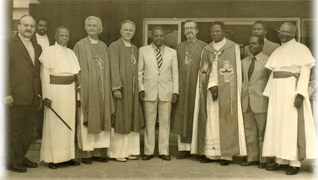Christianity is a progressive faith. From the creation narrative recorded in the book of Genesis to the consummation of all things that are witnessed in Revelation, there is gradual unfolding of knowledge, truth, experiences, and events. While Genesis is a seed bed of revelation truth in which concepts, principles, and practices are introduced in their initial form, there is a gradual movement from types, symbols, and metaphors to realities. From one blood to many nations; from a few disciples to a global network of believers; there is a progression from the one to the many and from the simple to the complex. And yet, within this faith economy there is the timeless, timely, lesser and greater. That is, there are significant and insignificant matters which should only engage our time and attention correctly, And there are beliefs and practices that continue and discontinue or that never change despite the evolution of new generations of humanity (timeless) while the strategies and methods of implementation evolve and adapt to address new times and seasons (timely). The crisis of each generation transfer rests in the preservation of greater things.
The finished work of Jesus Christ provides many promises, privileges, and responsibilities for those who believe. The new birth offers forgiveness of sins; deliverance from the power of evil; baptism in the Holy Spirit; the dynamics of faith and hope; privilege of prayer; access to Divine things; ability to comprehend spiritual truths; and the right to a transformed life that can represent and demonstrate this faith. Yet, Christianity is not an incentive-driven faith. Despite its promises and privileges, these incentives must be understood as motives for responsibilities. The book of Job records the accusation of Satan that Job only serves God because of the incentives. And if those incentives were taken away, then Job would turn from God. The Lord Jesus declares to the multitude of people that follow His ministry that they do so for the "loaves and fishes." That is, if faith is viewed only as a doorway to earthly pleasures and benefits then the absence of such provisions can potentially create a crisis of faith. This is a very critical distinction for when it is not understood many believers will fall away.
The existence of challenges, difficulties, deficiencies, and even persecution must be embraced as a part of living in a world organized on wrong principles. It is interesting that Paul writes to the Philippians that he has learned to be content in whatever state he experiences; he can be abased or abound (Phil. 4). In fact, Paul encourages the youthful Timothy to endure hardness as a good soldier and not be entangled with the affairs of this life. Paul also forewarns the youthful leader of challenges, desertions, and even disappointments such as Alexander coppersmith, Demas, defections of churches in Asia and even the warnings concerning the latter days. Such life experiences do not occur simply because of a lack of faith, ignorance of the promises of God, rebellion nor sin. It is somewhat presumptuous to believe that every problem experienced in life is due to a spiritual deficiency, a human failure, or even a Divine test to prove faith. A non-utopian world offers it share of challenges regardless of the spiritual status of the believer. But there is always the promise and privilege of deliverance. If there are no suffering nor challenges in our faith equation, then all the blessings of God are defined as simply tangible earthly things. And if these "blessings" are not always evident in material provisions, then faith becomes shipwrecked when they are absent. The crisis of faith rests in maintaining a tension between promise, privilege, responsibility, and challenge. Contentment must be learned in all circumstances of life, whether in abundance or scarcity. Our love for God is not simply because of earthly pleasures but because we have been given the right to participate in a tremendous mission. That is, to be an example of the believer in word, in conversation, in charity, in spirit, in faith, and in purity.


